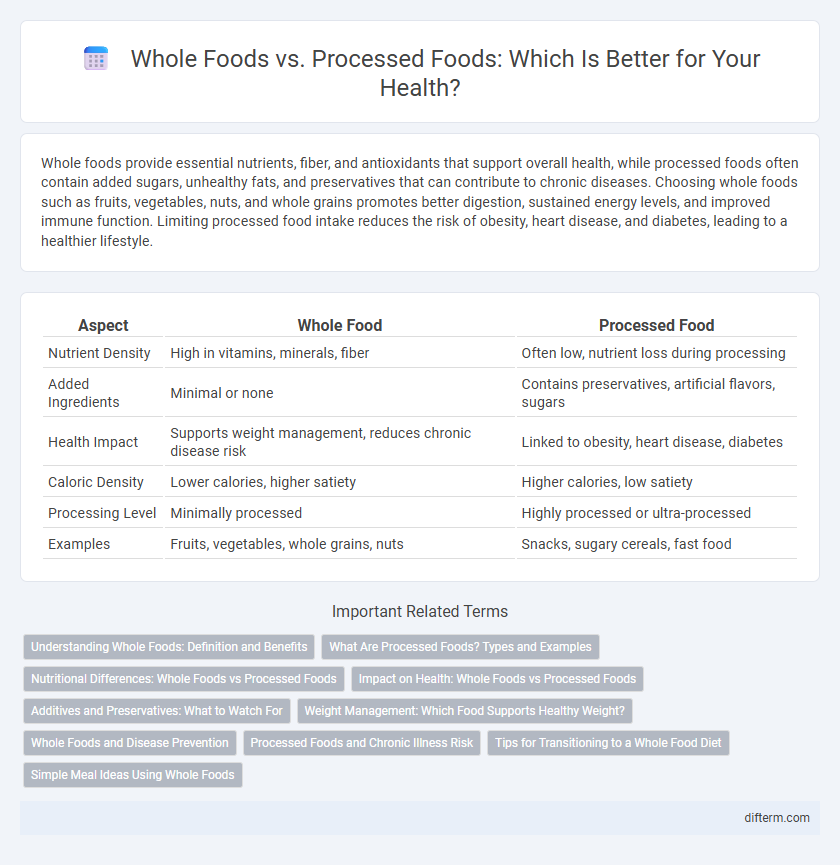Whole foods provide essential nutrients, fiber, and antioxidants that support overall health, while processed foods often contain added sugars, unhealthy fats, and preservatives that can contribute to chronic diseases. Choosing whole foods such as fruits, vegetables, nuts, and whole grains promotes better digestion, sustained energy levels, and improved immune function. Limiting processed food intake reduces the risk of obesity, heart disease, and diabetes, leading to a healthier lifestyle.
Table of Comparison
| Aspect | Whole Food | Processed Food |
|---|---|---|
| Nutrient Density | High in vitamins, minerals, fiber | Often low, nutrient loss during processing |
| Added Ingredients | Minimal or none | Contains preservatives, artificial flavors, sugars |
| Health Impact | Supports weight management, reduces chronic disease risk | Linked to obesity, heart disease, diabetes |
| Caloric Density | Lower calories, higher satiety | Higher calories, low satiety |
| Processing Level | Minimally processed | Highly processed or ultra-processed |
| Examples | Fruits, vegetables, whole grains, nuts | Snacks, sugary cereals, fast food |
Understanding Whole Foods: Definition and Benefits
Whole foods are natural, unprocessed foods such as fruits, vegetables, whole grains, nuts, and legumes that retain their original nutrients and fiber content. Consuming whole foods supports improved digestion, enhanced nutrient absorption, and reduced risk of chronic diseases like diabetes, heart disease, and obesity. These foods provide essential vitamins, minerals, antioxidants, and phytochemicals that promote overall health and immune function.
What Are Processed Foods? Types and Examples
Processed foods are items altered from their natural state through methods like canning, freezing, or adding preservatives to extend shelf life and enhance flavor. Common types include minimally processed foods such as washed and packaged fruits, moderately processed items like canned vegetables and cheese, and heavily processed foods such as sugary snacks, instant noodles, and deli meats. Examples of processed foods are frozen dinners, breakfast cereals, soft drinks, and processed meats like sausages and bacon, often containing added sugar, salt, and artificial ingredients.
Nutritional Differences: Whole Foods vs Processed Foods
Whole foods retain their natural nutrients, including fiber, vitamins, and minerals, which are often diminished or removed during food processing. Processed foods typically contain added sugars, unhealthy fats, and preservatives that can negatively impact metabolic health and increase the risk of chronic diseases. Consuming nutrient-dense whole foods supports better digestion, stable blood sugar levels, and overall improved nutritional intake compared to heavily processed alternatives.
Impact on Health: Whole Foods vs Processed Foods
Whole foods, rich in essential nutrients and fiber, support optimal digestion, boost immune function, and reduce the risk of chronic diseases like diabetes and heart disease. In contrast, processed foods often contain added sugars, unhealthy fats, and preservatives, which contribute to inflammation, obesity, and metabolic syndrome. Choosing whole foods over processed options enhances overall health and promotes long-term wellness.
Additives and Preservatives: What to Watch For
Whole foods contain minimal to no additives or preservatives, making them a healthier choice by reducing exposure to artificial chemicals linked to allergies and digestive issues. Processed foods often include additives such as artificial colors, flavors, and preservatives like sodium benzoate and nitrates, which can contribute to health problems when consumed in excess. Reading labels for ingredients like monosodium glutamate (MSG), BHA, and BHT helps identify potentially harmful additives and maintain a balanced diet.
Weight Management: Which Food Supports Healthy Weight?
Whole foods, rich in fiber, vitamins, and natural nutrients, support healthy weight management by promoting satiety and reducing overeating. Processed foods often contain added sugars, unhealthy fats, and empty calories, which can contribute to weight gain and metabolic issues. Choosing whole foods like fruits, vegetables, lean proteins, and whole grains enhances metabolism and supports long-term weight control.
Whole Foods and Disease Prevention
Whole foods, rich in essential nutrients and antioxidants, play a critical role in disease prevention by reducing inflammation and enhancing immune function. Diets high in fruits, vegetables, whole grains, and lean proteins correlate with lower risks of chronic conditions such as heart disease, diabetes, and certain cancers. Incorporating diverse whole foods supports gut health and promotes long-term wellness through balanced nutrient intake and minimized exposure to harmful additives.
Processed Foods and Chronic Illness Risk
Processed foods, often high in added sugars, unhealthy fats, and sodium, significantly increase the risk of chronic illnesses such as heart disease, type 2 diabetes, and obesity. Frequent consumption of ultra-processed products is linked to inflammation, insulin resistance, and disrupted metabolic function. Reducing intake of processed foods and prioritizing nutrient-dense whole foods can mitigate these health risks and promote long-term wellness.
Tips for Transitioning to a Whole Food Diet
Gradually replace processed snacks with fresh fruits, vegetables, and whole grains to ease the transition to a whole food diet. Prioritize cooking meals at home using minimally processed ingredients like legumes, nuts, and lean proteins to enhance nutrient intake. Plan weekly grocery lists featuring seasonal produce and avoid aisles with packaged foods to reinforce healthy shopping habits.
Simple Meal Ideas Using Whole Foods
Simple meal ideas using whole foods include fresh salads with leafy greens, nuts, and seeds, vibrant fruit bowls, and roasted vegetables paired with lean proteins like grilled chicken or fish. Whole foods provide essential nutrients, fiber, and antioxidants, promoting better digestion and sustained energy levels compared to processed alternatives. Prioritizing whole foods helps support immune function and reduces the risk of chronic diseases such as diabetes and heart disease.
Whole Food vs Processed Food Infographic

 difterm.com
difterm.com